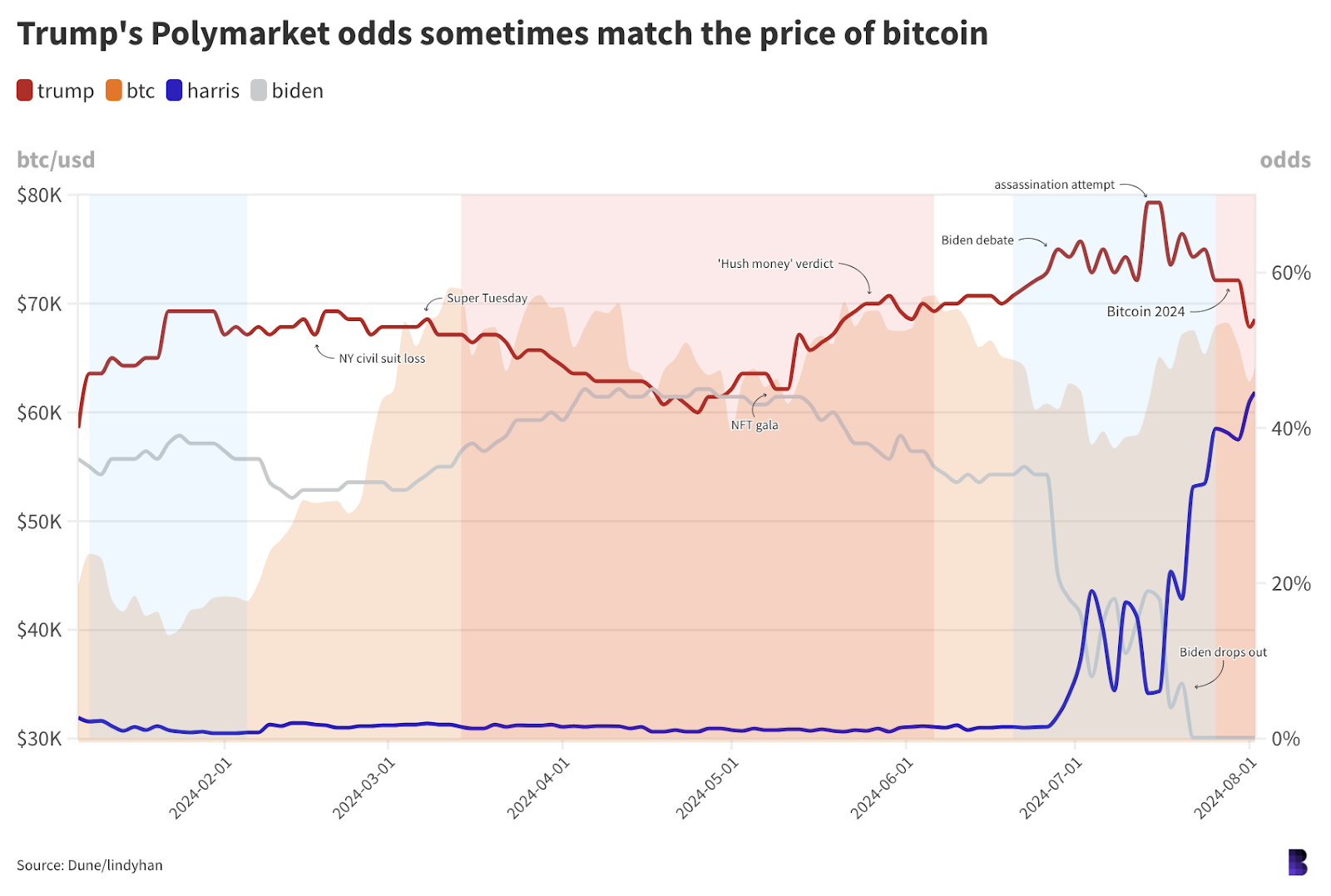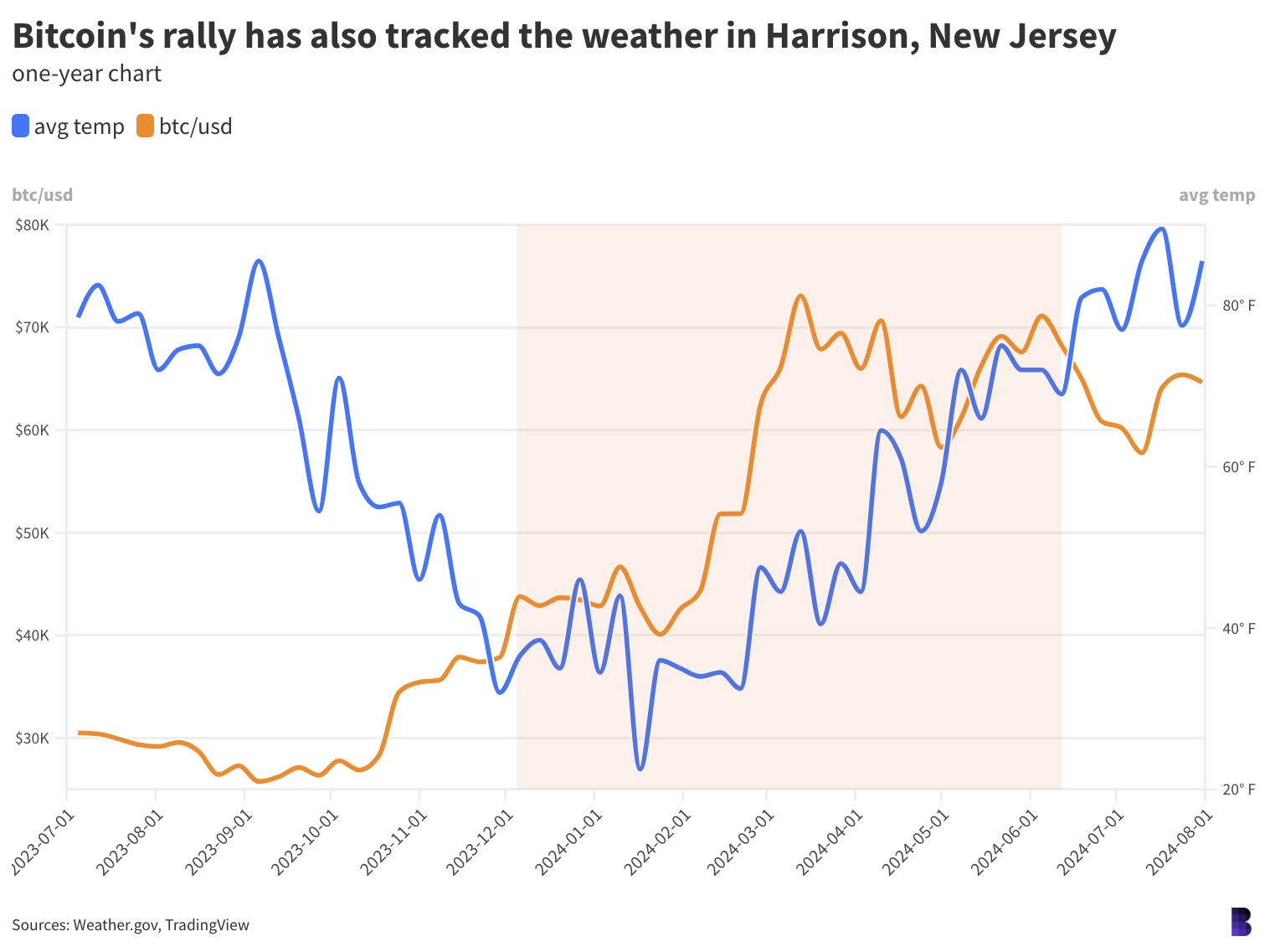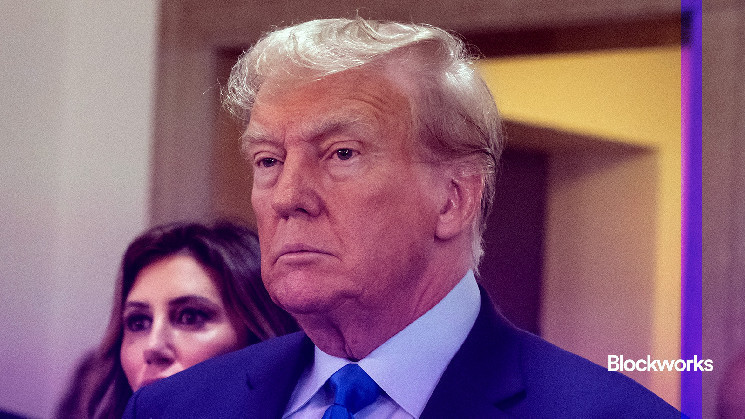Today, enjoy the Empire newsletter on Blockworks.co. Tomorrow, get the news delivered directly to your inbox. Subscribe to the Empire newsletter.
TRUMPWIN
Betting on the US election with prediction markets is the use case du jour for crypto.
But instead of betting with USDC on Polymarket, powered by Polygon smart contracts, the same effect could very well be had by simply buying bitcoin — sometimes.
The chart below plots Polymarket odds for Trump, Biden and Harris since the start of the year.
Trump is the line in red, Harris is in blue and Biden is in gray. The price of bitcoin is shown in the background by the orange area.
In the middle is a red shaded area, a stretch of almost three months between mid-March and early June during which Trump’s odds on Polymarket matched the price growth of bitcoin almost exactly.

The correlation began just after Trump and Biden swept Super Tuesday, all but confirming a rematch. A few days later, Trump called bitcoin an “additional form of currency” on CNBC — at the time, one of his most positive remarks about crypto to date.
Over the next six weeks, Trump’s Polymarket odds fell from 54% to as low as 42%, with Biden briefly taking the lead on the back of a series of positive polling. The price of bitcoin otherwise dropped more than 20%, from its all-time high above $73,700 to nearly $58,300.
Both Trump’s perceived chances and bitcoin’s price bounced at the same time in May — coinciding with Trump’s pro-crypto NFT gala — and regained a similar amount over the following month.
There’s also been correlation since Bitcoin 2024 last Saturday: Trump’s reading fell 59% before his speech to as low as 53% earlier this week. Bitcoin meanwhile sank up to 11%, from over $70,000 after Bitcoin 2024 to as low as $62,300 on Thursday.
Bitcoin has since recovered, by 3%, while Trump’s odds have done the same, by 1%.
But whatever correlation between Trump’s campaign and the price of bitcoin isn’t really apparent outside of those two periods.
The blue shaded areas on the chart above show times at which bitcoin and Trump’s Polymarket data were inversely correlated — most recently leading up to the first presidential debate against Biden in June and Bitcoin 2024 in late July.
The price of bitcoin fell over 10% across that period while Trump’s odds increased from 57% to an all-time high of 69% after he survived the assassination attempt.

For what it’s worth, the price of bitcoin correlates with all sorts of things. Even the weather, depending on where you are.
Crypto markets love narratives and the Trump arc is no different. But that the price of bitcoin sometimes mirrors the likelihood of a Republican victory in November is probably just noise — for now.
If only there were a Polymarket for whether we’ll see more correlation moving forward. At least we have bitcoin.
— David Canellis
Data Center
- AAVE is the top performer on the front-page over the past week, gaining 15.6% following a fee switch temperature check.
- WIF, RENDER and SEI have retraced the hardest, down 27%, 21% and 20% apiece over the same period.
- ETH ETFs saw their third day of net inflows out of eight since their launch, gaining $26.7 million. Net flows to date: negative $456.9 million.
- Monthly DEX derivatives volumes on Arbitrum and Solana are up over 60% to $1.65 billion and $1.19 billion, respectively.
- Mt Gox is now 77% done with BTC distributions: 32,899 BTC ($2.12 billion) left to go.
Bullish attitudes
Two of the biggest crypto companies trading on the Nasdaq reported earnings last night, giving us a bit of insight into what’s happening behind the scenes.
Coinbase surprised to the upside on the revenue, reporting $1.4 billion, which was slightly higher than the $1.36 billion expected by analysts but let’s be clear: a beat is a beat. That figure is still lower than what they reported earlier this year, though it makes sense when you take the volatility experienced throughout crypto last quarter into account.
Also notable that Base transactions grew 300% quarter-over-quarter, despite the aforementioned volatility.
MicroStrategy, however, didn’t beat expectations and posted (another) loss, which was caused partially because of an impairment charge against the firm’s substantial bitcoin holdings.
Unsurprisingly, Michael Saylor’s company went on a bit of a buying spree, adding 169 bitcoin ($10.9 million) to its cache in July.
What is interesting though is the $2 billion equity offering program the firm filed for last night.
Now let’s be clear: Outside of the crypto connections, these companies are fundamentally different. MicroStrategy is competing against bitcoin ETPs and collecting bitcoin, while Coinbase is, well, an exchange with a successful L2.
But there’s a lot that can be gleamed from the forward looking statements and earnings calls, which makes both of them a bellwether.
For example, Coinbase plans to scale its headcount moving forward “to support our product and international expansion.”
Coinbase executives, on the call with Wall Street analysts, said that the retail engagement is different this cycle (in part because of Coinbase’s offerings, which focused just on the trading product platform last bull market).
“We’re seeing our retail engagement now expand in many different ways, where we have different customers behaving in different ways in the platform than we saw in prior cycles. What we see as consistent is that traders, specifically, who are coming on the platform to buy or sell crypto behave very in-line with prior volatility, and so volatility patterns mirror this cycle compared to prior cycles, but the deeper engagement is with the breadth of the portfolio that we now,” an executive said.
CEO Brian Armstrong — touching on something we’ve talked about a lot here in Empire — said that the institutions that they’re talking to are capping allocations to two or 3% into crypto because of the lack of regulatory clarity. Once there’s a path forward, Armstrong says that some firms could allocate 10-20%.
Saylor was also bullish on his call, opining that AI was going to lead to “big winners” and more trillion-dollar companies that will look for “high-speed digital assets” over the traditional material and labor investments.
“Those trillion dollar companies are going to generate capital an enormous rate, and there’s going to be a pressure to put that capital somewhere. And Bitcoin has emerged as the primary global digital capital asset, and so the macro trends are very good,” he said.
Here’s my takeaway: Let crypto cook (with proper regulation).
— Katherine Ross
The Works
- Bitcoin miner Marathon Digital missed revenue expectations in its earnings report late Thursday.
- Do Kwon will be extradited to South Korea over the US, a Montengrian court ruled.
- Prediction market Polymarket surpassed $1 billion in cumulative trading volume, The Block reported.
- Galaxy Digital CEO Mike Novogratz is “hopeful” that presidential hopeful Kamala Harris shows support for crypto.
- Investment firm Cypherpunk Holdings continues to add to its solana stash, the firm reportedly now holds roughly $21.6 million worth of SOL.
The Riff
Q: Does crypto really need a catalyst?
Maybe just to escape the sideways price action right now.
In the long-term, I think there’ll be plenty of driving factors. But right here and now, there are a lot of “well, if that happens then…” and, of course, “we have to prepare for…” without a whole lot of direct action.
Unfortunately, possibilities won’t really drive serious innovation or keep prices up.
Armstrong, in the Coinbase earnings call, was pretty clear that regulatory clarity is one of the biggest holdups for their business (which makes sense given the SEC suit they’re still battling) but I think it’s notable that he keeps harping on that point given how successful other areas of the business are.
Armstrong made some comments about how this is making the potential for new founders to come in and build successful startups or projects incredibly difficult, if not impossible. College kids, for example, can’t just start innovating in their parents’ garage without fear of a potential SEC probe.
So yeah, I think we need a catalyst and not just for price action, but for overall sentiment and innovation.
— Katherine Ross
An external catalyst? Not really.
We could certainly do without the slow erosion of rights, specifically around self-custody, privacy-preservation and crypto entrepreneurship. An agreeable White House might change that.
But bringing about another period of explosive growth, like the 2017-2018 Ethereum ICO boom or 2020’s DeFi Summer, might need an internal catalyst.
A new primitive that can be LEGOed onto all the different blockchains and trigger a cascade of innovation (and fresh liquidity) across the various crypto ecosystems we have today.
Maybe it’s something to do with AI. Or a timely reboot of an existing idea that was ahead of its time, like what we’re seeing with Polymarket right now.
There’s nothing wrong per se with crypto as it stands, but a fire still needs a spark.
— David Canellis
 blockworks.co
blockworks.co
